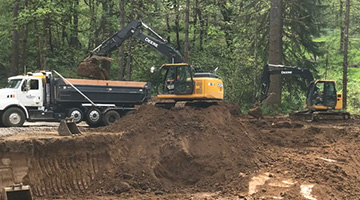Comprehensive Excavation Approaches: Mastering the Principles for Success
The careful planning, accurate implementation, and meticulous attention to detail needed in excavation tasks demand a detailed strategy that encompasses different basic elements. The true proficiency exists not merely in recognizing these fundamentals but in seamlessly integrating them to navigate the intricacies of excavation tasks with skill.
Understanding Excavation Job Preparation

The initial stage of any kind of excavation project is the planning stage, where crucial decisions are made that can significantly influence the result of the project. Comprehending the project timeline, budget plan, and extent restrictions is crucial for creating a detailed excavation plan that makes sure the task's success.
One key facet of excavation project planning is the growth of a comprehensive timeline that lays out the series of activities, target dates, and turning points. By carefully taking into consideration all these elements throughout the preparation phase, excavation tasks can be implemented effectively and properly, leading to successful outcomes - lancaster trenching.
Dirt Analysis and Website Assessment
Performing extensive dirt evaluation and site analysis is an important action in the preparation phase of any type of excavation task. Soil evaluation involves figuring out the composition, structure, and residential or commercial properties of the soil at the excavation website. This info is crucial for comprehending the dirt's bearing capability, dampness web content, and capacity for disintegration, which are vital factors in identifying the excavation techniques and equipment needed for the task.
Website evaluation goes past dirt analysis and includes a wider analysis of the overall site conditions. This evaluation includes recognizing any potential hazards, such as underground utilities, environmental worries, or unpredictable surface, that might affect the excavation procedure. By extensively reviewing the website, job managers can establish efficient excavation methods that focus on safety and security, efficiency, and environmental security.
Using sophisticated innovations like ground-penetrating radar, soil sampling, and drone surveys can boost the accuracy and effectiveness of dirt analysis and site analysis. Spending time and sources in these preliminary actions can ultimately save time and stop expensive delays or difficulties throughout the excavation procedure.
Devices Selection and Utilization
Reliable excavation jobs depend heavily on strategic tools selection and application to ensure optimum performance and performance. Choosing the right equipment for the work is critical in taking full advantage of efficiency and decreasing downtime. Variables such as the sort of dirt, deepness of excavation, and project scope play a significant duty in figuring out the most appropriate equipment for the job available.

Along with selecting the ideal devices, appropriate usage is essential to job success. Operators has to be trained to handle the equipment safely and efficiently - excavating ohio. Routine upkeep checks and timely repair services assist stop failures and make certain regular efficiency throughout the job
Precaution and Laws Conformity
In the world of excavation tasks, focusing on precaution and compliance with policies is paramount to ensuring a safe and lawfully sound operational environment. Precaution include a series of techniques, consisting of carrying out complete website analyses, here implementing appropriate signs and barriers, and supplying sufficient security training for all employees associated with the excavation process. Adherence to laws, such as OSHA demands in the United States, ensures that the excavation task meets the essential criteria to safeguard employees, onlookers, and the surrounding environment.

Surveillance Progression and Adjusting Approaches
How can forecast managers effectively track the advancement of excavation tasks and adjust their techniques accordingly to optimize end results? Tracking progress is important for making sure that excavation jobs remain on track and fulfill due dates. Project managers can make use of different devices and methods to track progress, such as day-to-day progression reports, normal site assessments, and progressed tracking innovations like drones and general practitioners tracking systems. By constantly keeping an eye on the project's development, supervisors Recommended Site can determine any kind of prospective hold-ups or issues early on and take positive measures to address them.

Conclusion
Finally, mastering the principles of extensive excavation methods is crucial for the success of any task. By understanding task planning, assessing soil and website problems, selecting ideal devices, abiding by safety and security laws, and checking development, task managers can make certain a efficient and smooth excavation procedure. Executing these approaches will cause effective outcomes and lessen potential dangers or setbacks during the excavation task.
The initial stage of any excavation job is the preparation stage, where essential choices are made that can substantially influence the outcome of the job. Recognizing the task scope, spending plan, and timeline restraints is crucial for producing a thorough excavation strategy that ensures the job's success.
How can predict supervisors effectively track the improvement of excavation jobs and adjust their techniques as necessary to maximize end results? By closely keeping track of development and being eager to adapt techniques, job managers can improve the general success of excavation jobs.
By understanding job planning, examining soil and site problems, selecting appropriate equipment, complying with safety regulations, and keeping track of development, job managers can guarantee a smooth and efficient excavation process.
Comments on “Specialist Septic Ohio - Relied On Septic Tank Professionals in Ohio”